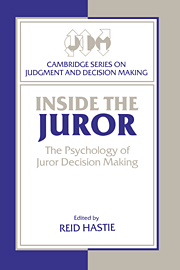Book contents
- Frontmatter
- Contents
- Series preface
- List of contributors
- Editor's preface
- Acknowledgments
- Part I Models of juror decision making
- 1 Introduction
- 2 Some steps between attitudes and verdicts
- 3 The influence of outcome information and attitudes on juror decision making in search and seizure cases
- 4 Algebraic models of juror decision processes
- 5 Stochastic models of juror decision making
- 6 Formal and empirical research on cascaded inference in jurisprudence
- 7 Argument structuring and evidence evaluation
- 8 The story model for juror decision making
- Part II Commentaries
- Index of names
- Index of subjects
6 - Formal and empirical research on cascaded inference in jurisprudence
Published online by Cambridge University Press: 04 August 2010
- Frontmatter
- Contents
- Series preface
- List of contributors
- Editor's preface
- Acknowledgments
- Part I Models of juror decision making
- 1 Introduction
- 2 Some steps between attitudes and verdicts
- 3 The influence of outcome information and attitudes on juror decision making in search and seizure cases
- 4 Algebraic models of juror decision processes
- 5 Stochastic models of juror decision making
- 6 Formal and empirical research on cascaded inference in jurisprudence
- 7 Argument structuring and evidence evaluation
- 8 The story model for juror decision making
- Part II Commentaries
- Index of names
- Index of subjects
Summary
Introduction
This paper contains an introduction to some of the results and observations we have accumulated from a series of studies on the task of assessing the probative value of inconclusive or probabilistic trial evidence. Some of these studies are formal or logical in nature and concern the manner in which the probative value of evidence should be assessed coherently. The other studies are empirical and behavioral in nature and concern the manner in which persons actually do assess the probative value of evidence. Our dual concern was voiced by Wigmore (1937, p. 8), who expressed interest in “…the reasons why a total mass of evidence does or should persuade us to a given conclusion, and why our conclusions would or should have been different or identical if some part of that total mass of evidence had been different.” Our formal and empirical studies have proceeded hand-inhand. Formal research helps to identify meaningful variables and measures for empirical research; empirical research, interesting in its own right, is also useful in testing the adequacy of the foundations for formal studies.
A major focus of our research has been upon inductive inference tasks, which Wigmore termed “catenated‘rdquo;; the modern terms for these tasks are “cascaded” or “hierarchical” (Wigmore, 1937, p. 13). Wigmore was the first to point out the fact that most inferential reasoning tasks are cascaded in nature. A cascaded inference task is composed of one or more reasoning stages interposed between evidence observable to the factfmder and the ultimate facts-in-issue.
- Type
- Chapter
- Information
- Inside the JurorThe Psychology of Juror Decision Making, pp. 136 - 174Publisher: Cambridge University PressPrint publication year: 1993
- 3
- Cited by



